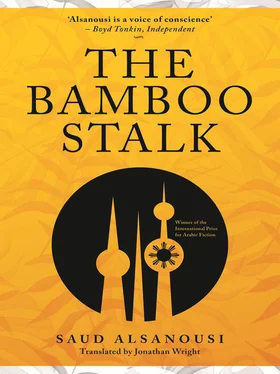Then an old woman appeared at the top of the stairs, leaning on Khawla’s arm and holding the banister with her other hand. She had to be my grandmother, Ghanima. She wasn’t looking at us in the sitting room. Her eyes were on the steps by her feet. She was having trouble bending her legs and was coming down slowly. She had covered her hair loosely with a thin black shawl, quite different from Khawla’s hijab . Some of her hair showed from under the shawl. Because she was concentrating on making her way down the stairs, I had an opportunity to take a long look at her face without her seeing me. With every step she took I discovered something new in her face. She was old — the wrinkles in her dark skin showed that. Her lips were thin, or she didn’t have lips, if I can say that — just a horizontal slit under her nose. She had thick eyebrows and a large, protruding nose that was hooked at the end. Her eyes were small and bright, with black pupils so large that hardly any white was visible around them. She had a keen gaze, as if she could see through things. Her crooked nose and her bright eyes gave her the look of a golden eagle.
As my grandmother approached, leaning on Khawla’s arm, Ghassan and my aunt Hind stood up respectfully for her. I stood up too. She nodded in greeting to Ghassan. I was at a loss. I didn’t know what my role was or what I should do. Should I bow, take her hand and press it to my forehead as we do in the Philippines? In her presence I stood there confused, like someone meeting the leader of a tribe and ignorant of the social conventions. Ghassan turned to me and said, ‘Kiss your grandmother on her forehead.’
My heart raced. I looked at her forehead as if I were about to kiss a hot piece of metal. She wasn’t looking at me. I stepped towards her, encouraged by Ghassan’s smile and the happiness on Khawla’s face. I was standing in front of her, but as soon as I moved my face towards her forehead she raised her hand, which was stained dark brown with henna presumably, and put it on my shoulder, preventing me from coming any closer. I pulled back. She looked me straight in the eyes. My lips began to tremble and I bowed my head. She took her hand off my shoulder and involuntarily I examined the part of my shirt where her hand had rested, in case the tribal leader had left a mark there as part of a ritual recognising me as a member of her tribe. But nothing in this little fantasy of mine came true. I looked up to her face. She was still staring at my face. Her eyes were glistening — was it a sign of intelligence or did it mean that tears were gathering and about to flow? I bowed my head again.
‘Kiss her forehead, Isa,’ Ghassan repeated. The hot piece of metal seemed even hotter now. My lips were trembling even more than before. I moved my face towards the metal to kiss it, but my grandmother turned her face away towards one of the sofas in the corner and asked Khawla to help her reach it. Grandmother sat down, after resting her hands on her knees and bending her legs with difficulty. Khawla brought her a stool on which to rest her legs, and everyone but me sat too.
Khawla looked at me standing there. ‘Please sit down,’ she said.
The Filipina maid came in with a tray of tiny glasses for tea, rather like shot glasses but with handles and little saucers. I didn’t look at the maid. I didn’t smile. I didn’t utter a word. Even when she gave me a glass of tea, on a saucer with a tiny golden spoon and two cubes of sugar, I found I couldn’t say ‘thank you’, though everyone else did. Grandmother was looking around, sometimes at me and the maid, sometimes at Ghassan and Hind, examining our faces with her keen gaze. She was on guard and I didn’t feel comfortable in her presence. Sitting in front of an interrogator as a suspect makes you feel uncomfortable, even if you’re innocent. How much more so if you’re a rat in the presence of an eagle?
‘ Salamuuu alekooom ,’ cried the parrot. Then two women came in, one in hijab and the other without. They greeted Ghassan and kissed Hind and Khawla. then bent down to kiss Grandmother’s forehead. Khawla introduced me to them: ‘My aunt Awatif and my aunt Nouriya.’ They sat down next to each other on a sofa in a corner of the large sitting room. They didn’t look a bit like each other. Awatif, the eldest, was wearing a black cloak and was clutching her handbag with both hands. Her legs were pressed together. She wasn’t wearing any make-up and she had a pleasant face, though she wasn’t pretty like Khawla and Hind. She was smiling all the time and seemed friendly. She had big eyes set far apart and a broad and prominent forehead. All in all, including her cheerful face, she reminded me of a dolphin. Nouriya was the complete opposite. She sat with her legs crossed and seemed very self-confident. She had a fair amount of make-up on and was noticeably elegant, with sharp features. She held her chin up and raised her eyebrows when she spoke. She seemed arrogant. I looked from one to the other, making a quick comparison. How did a dolphin and a shark come from the same womb , I wondered.
They were talking, each in her own way, while Grandmother watched them quietly. She looked at Hind if Ghassan was speaking, and then switched to Ghassan if Hind was speaking. They talked loudly and interrupted each other. Sometimes they looked at me and sometimes they pointed at me. Khawla was looking at me with the same smile she had had since she came into the room with Ghassan. They had a discussion that went on more than an hour. Ghassan nodded. Hind was tense, swinging one of her legs and speaking quietly. The dolphin smiled naively. The shark spoke excitably. The old eagle silenced everyone with a shake of her head. In the meantime the rat that was me was speechless, looking from one person to another in confusion and without understanding anything that was happening around me, except for the kind looks from a gentle little bird called Khawla.
8
When we were back in Ghassan’s flat after the visit to Grandmother’s house, I finally found out what had happened in the meeting. Ghassan had two options: either to hand over his charge, in other words me, to the Tarouf household, thereby fulfilling my father’s wishes, or to make arrangements for me to go back to my mother’s country. Khawla was happy to have discovered her new brother because, as she put it, if her mother had another child with her second husband her new brother or sister wouldn’t be as close to her in age as I was, so she insisted on me staying. ‘I’ll teach him Arabic and I’ll look after him. Don’t you worry about him, Grandmother,’ she had said.
Awatif, my eldest aunt, was very happy. She didn’t see a problem, and she was enthusiastic about me staying in Grandmother’s house because, as she put it, ‘He’s our son.’ Although the others ignored her opinion, she had insisted on recognising me. ‘He’s my brother’s son. God wouldn’t like it if we disowned him,’ she had said. Ghassan made me happy when he told me what she said. I was delighted to hear that God was present at the meeting to hear what was going on. Even if I hadn’t seen Him, I was reassured that He was present in Awatif’s heart, because that meant He was nearby. I asked God to enter my heart as well.
Nouriya was totally opposed to me being around and had got angry with Awatif and warned her of what might happen if her husband, Ahmad, found out about me. Awatif wavered a while when her husband was discussed but she later relented. ‘My husband is a God-fearing man and would not take a negative position if he found out,’ she said. Nouriya had grown angrier and raised her voice. She said that, if there was no other way out, my full name should be just Isa Rashid Isa and the Tarouf name should be removed from my official papers. They should look for somewhere that could put me up, away from the Tarouf house, or settle the matter by offering me some money and sending me back to the Philippines, she added. She lost her temper. ‘Kuwait’s a small place and word spreads fast,’ she said. ‘If my husband and his family find out about this boy, it will change the way my husband sees me. I’ll lose the respect of the Adil family and I’ll be the laughing stock of Faisal’s sisters and sisters-in-law.’ Angrily, she had picked up her handbag to leave. Before she stormed out, she said, ‘I have a son and a daughter of marriageable age and I won’t allow this Filipino to wreck their prospects.’
Читать дальше












